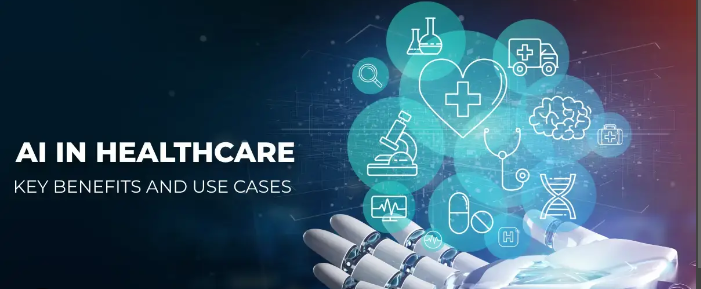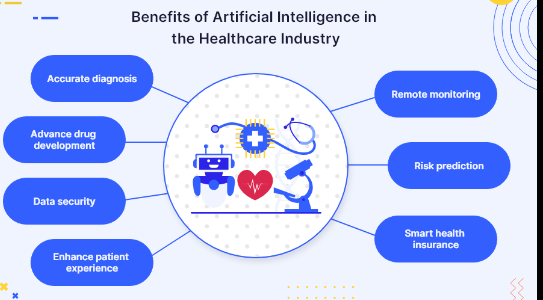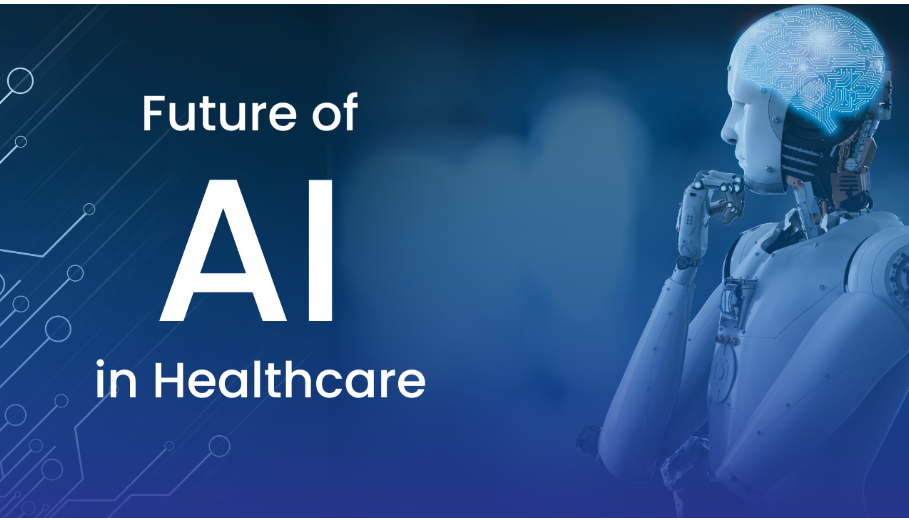
AI in Healthcare: Transformative Applications and Key Technologies 2024
Artificial Intelligence (AI) is revolutionizing the healthcare industry, leading to groundbreaking advances in the way diseases are diagnosed, treated, and managed. This comprehensive guide will explore the core applications and key technologies of AI in healthcare, highlighting its role in disease prediction, medical imaging, drug discovery, personalized treatments, and more.
Applications of AI in Healthcare
- Disease Prediction
- AI models excel at analyzing vast datasets to predict disease outbreaks or diagnose early-stage conditions. Predictive analytics, powered by machine learning algorithms, can assess risk factors and anticipate the likelihood of diseases such as diabetes, cancer, and heart disease.
- Example Formula (Logistic Regression):htmlCopy code
<!-- Logistic regression equation in HTML --> <p>Prediction = 1 / (1 + e^-(β<sub>0</sub> + β<sub>1</sub>X<sub>1</sub> + β<sub>2</sub>X<sub>2</sub> + ... + β<sub>n</sub>X<sub>n</sub>))</p>
- Medical Imaging Analysis
- AI techniques, particularly deep learning, are pivotal in medical imaging, enhancing the accuracy of detecting diseases in MRI, CT scans, and X-rays. Convolutional Neural Networks (CNNs) are commonly used for image classification and segmentation, helping to identify anomalies such as tumors or fractures.
- Drug Discovery
- AI accelerates drug discovery by analyzing chemical interactions and predicting the efficacy of compounds. Machine learning algorithms can reduce the time required for the drug development process from years to months by simulating interactions and identifying potential candidates for clinical trials.
- Example Formula (Simplified Drug Binding Prediction):htmlCopy code
<!-- Scoring function for drug binding affinity --> <p>Score = Σ (w<sub>i</sub> * Interaction<sub>i</sub>)</p>
- Personalized Treatment
- Personalized medicine, supported by AI, allows treatments to be tailored to individual patients based on genetic information and medical history. AI models analyze patient data to recommend treatment plans that maximize efficacy while minimizing side effects.
Key Topics in AI for Healthcare
- AI Models for Genomics
- Genomics involves the study of the complete genetic material of an organism. AI algorithms analyze DNA sequences to identify mutations, predict disease susceptibility, and understand genetic factors in diseases.
- Example: Neural Networks for Gene Expression:
<!-- Feedforward neural network for genomics --> <p>Output<sub>i</sub> = f(W<sub>i</sub> * Input + b<sub>i</sub>)</p>
- Patient Data Analysis
- AI assists in the aggregation and analysis of electronic health records (EHRs) to identify patterns and trends that are valuable for patient care management. Natural Language Processing (NLP) extracts meaningful information from unstructured clinical notes, enhancing decision-making.
- Data Processing:
<!-- Pseudocode for patient data analysis using AI --> <pre> input: patient EHR data apply NLP techniques extract and analyze trends for diagnosis </pre>
- Virtual Health Assistants
- AI-driven virtual health assistants are used for tasks like appointment scheduling, medication reminders, and patient education. These assistants use AI models to understand and respond to user queries, creating a seamless patient experience.
Challenges for Artificial Intelligence in Healthcare

As healthcare organizations increasingly invest in the use of artificial intelligence in healthcare for a range of tasks, the challenges facing this technology must be addressed, as there are many ethical and regulatory issues that may not apply elsewhere.
Some of the most pressing challenges for AI used in healthcare include data privacy and security, patient safety and accuracy, training algorithms to recognize patterns in medical data, integrating AI with existing IT systems, gaining physician acceptance and trust, and ensuring compliance with federal regulations. Data privacy is particularly important as AI systems collect large amounts of personal health information which could be misused if not handled correctly. Additionally, proper security measures must be put into place in order to protect sensitive patient data from being exploited for malicious purposes.
Patient safety and accuracy are also important concerns when using AI in healthcare. AI systems must be trained to recognize patterns in medical data, understand the relationships between different diagnoses and treatments, and provide accurate recommendations that are tailored to each individual patient. Furthermore, integrating AI with existing IT systems can introduce additional complexity for medical providers as it requires a deep understanding of how existing technology works in order to ensure seamless operation.
Finally, gaining acceptance and trust from medical providers is critical for successful adoption of AI in healthcare. Physicians need to feel confident that the AI system is providing reliable advice and will not lead them astray. This means that transparency is essential – physicians should have insight into how the AI system is making decisions so they can be sure it is using valid, up-to-date medical research. Additionally, compliance with federal regulations is a must to ensure that AI systems are being used ethically and not putting patient safety at risk.
The Benefits of AI in Healthcare

How has AI impacted the health industry? AI for healthcare offers the ability to process and analyze vast amounts of medical data far beyond human capacity. This capability was instrumental in diagnosing diseases, predicting outcomes, and recommending treatments. For instance, AI algorithms can analyze medical images, such as X-rays and MRIs, with greater accuracy and speed than human radiologists, often detecting diseases such as cancer at earlier stages.
Examples of artificial intelligence in healthcare are diverse and impactful. A significant development besides IBM’s Watson Health was Google’s DeepMind Health project, which demonstrated the ability to diagnose eye diseases from retinal scans with a level of accuracy comparable to human experts. These pioneering projects showcased AI’s potential to revolutionize diagnostics and personalized medicine.
The question of how is AI used in healthcare extends beyond diagnostics. AI applications are also reshaping patient care management, drug discovery, and healthcare administration. In patient care, AI-driven chatbots and virtual health assistants provide 24/7 support and monitoring, enhancing patient engagement and adherence to treatment plans. In drug discovery, AI accelerates the drug development process by predicting how different drugs will react in the body, significantly reducing the time and cost of clinical trials.
Another area where AI used in healthcare has made a significant impact is in predictive analytics. Healthcare AI systems can analyze patterns in a patient’s medical history and current health data to predict potential health risks. This predictive capability enables healthcare providers to offer proactive, preventative care, ultimately leading to better patient outcomes and reduced healthcare costs.
AI streamlines various processes within healthcare facilities. From scheduling appointments to processing insurance claims, AI automation reduces administrative burdens, allowing healthcare providers to focus more on patient care. This not only improves operational efficiency but also enhances the overall patient experience.
The rise of AI in healthcare has been a gradual but steady journey, catalyzed by technological advancements and the increasing demand for improved healthcare delivery. The integration of AI into the medical field has brought about a paradigm shift, making healthcare more efficient, accurate, and personalized. As AI technology continues to evolve, its role in healthcare is set to become even more significant, further solidifying its status as an indispensable tool in modern medicine. This journey of AI from a novel concept to a fundamental aspect of healthcare exemplifies a technological revolution, with the promise of better health outcomes for all.
Importance of AI testing in healthcare
The delivery of medical care demands high quality and accuracy with zero chances for error. Hastily built or faulty AI based applications that have a chance to showcase wrong insights put human life at stake.
Quality testing of AI based healthcare applications is critical to enable medical professionals to deliver premium care to all patients. QA of AI based devices and applications takes longer than average, mostly due to the stringent quality and functionality checks. AI testing for QA for such applications and devices greatly helps build on accuracy and faster analysis of data derived from the large number of test cases used.
In application and software quality assessment, AI testing helps improve upon agility by learning from test data through pattern generation and recognizing changes in the system and adapting quickly so that test failure does not happen. This is also related to self healing capacity of AI testing systems wherein rapid changes are recognized and accepted automatically. Finally, AI testing in healthcare for medical devices and application allows for reduced testing costs and manual labor investment.
Building AI based healthcare application and software requires rigorous testing with a skilled team of QA experts to ensure delivery of highest quality. Comprised of a team of experienced quality testers with years of experience, Qualitrix can help you test your healthcare application and support your business growth. To know more about AI based testing for applications and software.
The Future of AI in Healthcare

During the 2024 Precision Med TriConference, Mara Aspinall of Illumina Ventures engaged in a fireside chat with Eric Topol, who holds an endowed chair and serves as the executive VP and professor at Scripps Translational Science Institute, to explore the integration of precision medicine and artificial intelligence (AI). Topol, an author of three books and over 1,200 peer-reviewed publications, is a prominent figure in digital medicine. He believes that AI adoption in healthcare is crucial and imminent. However, he questions whether the medical community is prepared for such a shift.
Topol remarked, “I believe this will be the most significant transformation in medical history, yet we are only at the beginning. We lack the necessary solid evidence from real-world applications. Until we obtain this, we must approach our advances with caution. Nevertheless, the indicators of progress are emerging rapidly.”
With the new AI technology in healthcare of medical tools and intelligent algorithms that are able to interpret large data sets, the potential for using AI in healthcare is limitless. Deep learning AI can be used to help detect diseases faster, provide personalized treatment plans and even automate certain processes such as drug discovery or diagnostics. It also holds promise for improving patient outcomes, increasing safety and reducing costs associated with healthcare delivery.
The future of using artificial intelligence in healthcare is undoubtedly bright and filled with possibilities for further innovation. As we move forward into a more connected digital world, using AI in the healthcare industry will become an invaluable asset that could potentially reshape how doctors treat patients and deliver care. With such great potential, it is clear that using artificial intelligence in healthcare holds the promise of a future filled with advancements, improved health outcomes and better patient experiences.
The primary obstacle for AI in healthcare isn’t its capability to be effective, but rather its integration into everyday clinical practice. Over time, medical professionals might shift towards roles that necessitate distinctly human skills, particularly those involving advanced cognitive functions. It’s possible that the only healthcare providers who won’t fully benefit from AI advancements are those who choose not to embrace its use.
Conclusion
AI is driving a significant transformation in healthcare by enabling predictive, personalized, and data-driven solutions. With its wide-ranging applications from disease prediction and medical imaging analysis to drug discovery and personalized treatment, AI is poised to revolutionize the future of medicine. As advancements continue, the integration of AI in healthcare will bring more accurate diagnoses, better patient care, and overall improvements in the healthcare ecosystem.
This blog aims to provide a structured overview of how AI is reshaping healthcare, underpinned by examples and formulas for a deeper understanding.